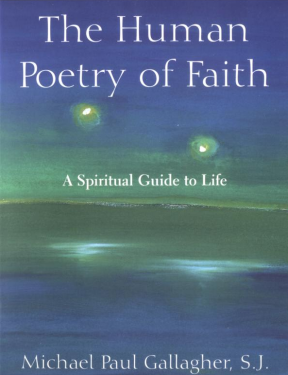 This is the first column in a series
This is the first column in a series
OFTEN DURING THE Lenten season I decide to read a book that I think will help me observe the season better. This year, I picked a beauty. It is Jesuit Father Michael Gallagher’s “The Human Poetry of Faith: A Spiritual Guide to Life” (New York, Paulist Press, 2003, pp. 142, $12.95). Father Gallagher deals with problems that have been on my mind for years.
The book was written for those who cannot seem to relate to traditional Catholic faith, those who might say something like “Religion is not on my radar.” In my own experience, such people are multiplying. I cannot precisely locate them in an age group but I think of them as Catholics, ages 18 to 40.
On the first page, Father Gallagher states that the book’s purpose is to evoke our human adventure. He wishes to make Christian faith more real through exploring our ordinary, but deep experiences. He writes the following:
“For many years I have sensed that the main blockage to Christian believing lies in our lifestyles and not in our ideas. The way we live can keep us adrift on the surfaces of ourselves and unable to reach deeper levels of searching. This happens within individuals. But it is also a cultural unfreedom, a shared cultural desolation. When we suffer from malnutrition in our self-images, we become incapable of imagining God. Look at the faces in the streets of any city. Many of them appear stressed, as if fighting to survive in a perpetual battle against time. Fragmentation and hyperactivity are the hallmarks, they say, of post modernity…
“Our culture has difficulty with the antechambers of faith, rather than with faith itself. It is on the level of disposition and desire that we need help most.” (pp. 1-2)
Father Gallagher believes that there are depths to everyone – hidden spaces even unknown to themselves. I agree completely but what I have been wondering about for years is how to help people face those depths, those spaces. How do we help people reflect on what should be most important in their lives? I try to do that by presenting Catholic faith in homilies, essays and books, but Father Gallagher suggests that we have to start further back. To help people reach the religious level we have attained, start with the pre-religious. I suspect that he is correct. If he is, it might explain why some people seem unmoved by the Good News of Christ, even uninterested. For some, there may be need for a preamble, some reflection that frees them to accept the surprise of Christ.
In reading this book I came to see that reflecting on the pre-religious might not only help others, but that I, and perhaps some of my friends, who are practicing Catholics, also might profit from such reflection. The Holy Spirit is everywhere and even when we think about ourselves and our experiences with no direct link to our faith, we may be discovering truths that will help us to believe on a new level, truths that might even help us to fall more deeply in love with God.
Growth Through Grace
Commenting on his book, Father Gallagher points out that it is not only more pre-religious than religious, but also more imaginative than systematic, more spiritual than theological. He writes the following:
“At its simplest it wants to evoke human experiences of depth and it ponders them as the theatre of the Spirit. It hopes to show that these encounter points with God are more frequent than we think – if we think in narrowly ‘religious’ terms. There is a larger drama of growth through grace that is lived out in different ways in everyone.” (p. 3)
I am reminded of Pope Francis’ insistence that God is part of everyone’s life. This is true even if some people don’t believe it.
One way that Father Gallagher tries to help people reflect on the depth of some so-called ordinary experiences is by imagining conversations between famous authors, people who may have seen aspects of the human mystery that many of us miss and were able to express those aspects in their writing. I found those sections of Father Gallagher’s book brilliant.
Father Robert Lauder, philosophy professor at St. John’s University, Jamaica, is the author of “Pope Francis’ Spirituality and Our Story” (Resurrection Press).
